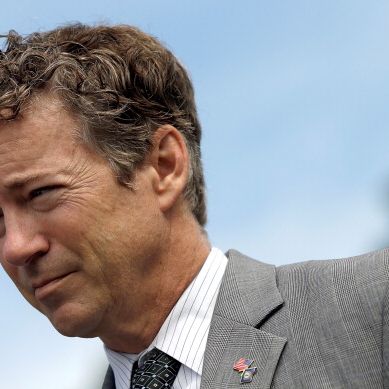
Rand Paul, speaking yesterday to a conservative group (his remarks were generously provided by Dave Weigel), explained his view on the proper formula for economic prosperity: tax cuts, and plenty of ‘em. “When we dramatically lowered tax rates in the ‘80s, we got an enormous boom in our country, probably for two decades,” explained the 2016 presidential candidate. “Many of us believe that the ‘80s and the ‘90s, once the boom began, had a lot to do with lowering the tax rates.” On many policy areas, economic and otherwise, Paul speaks for libertarians, kooks, Confederate apologists, or all three. In this case, he is advocating what remains firm Republican orthodoxy. The trouble is that this theory, despite its plausible ring and respectable place in the party’s policy orthodoxy, Paul’s beliefs on tax rates also happen to be, on the intellectual merits, pure kookery.
In 1981, Ronald Reagan cut taxes. The next year, the economy slipped into a deep recession, after which it enjoyed a fine recovery. Ever since then, Republicans have insisted that the recovery (but not the recession) was caused by the tax cuts, and thus that tax rates play an essential role in economic growth. The argument was persuasively rebutted at the time. (Paul Krugman’s 1994 book Peddling Prosperity devoted considerable space to dismantling it.) The best thing this theory had going for it was that the chronology, at least, sort of made sense. First you had tax cuts, then you had a recovery — if you ignore the 1982 recession, which nobody blamed on the tax cuts. A was followed by B and then C, so it sounded reasonable to argue that A caused C. This logic, such as it is, has formed the basis for Republican economic policy ever since.
The trouble is that, since that time, all the major events have run in the exact opposite direction. In 1993, Bill Clinton raised taxes on the rich, and conservatives uniformly warned this would have dire economic consequences. When, instead, a boom ensued, the Republican line changed: It was Reagan’s economy all along, and the devastating impact of Clinton’s class war was forgotten. Then, in 2001 and 2003, George W. Bush cut taxes, which conservatives claimed would lead to (or had already caused!) a boom. Occasional republican policy adviser, conservative columnist, and CNBC pundit Lawrence Kudlow wrote, on December 7, 2007:
There’s no recession coming. The pessimistas were wrong. It’s not going to happen. At a bare minimum, we are looking at Goldilocks 2.0. (And that’s a minimum). Goldilocks is alive and well. The Bush boom is alive and well. It’s finishing up its sixth consecutive year with more to come.
Of course the Bush recovery produced utterly mediocre results and was itself reliant upon an asset bubble that led to a catastrophic collapse.
Conservatives decried the painful recovery from the collapse, but it is worth keeping in mind that the Bush tax cuts remained in effect through 2012. As President Obama threatened to block the extension of the Bush tax cuts for the richest Americans, Republicans warned that devastating consequences would follow:
A study commissioned by pro-business organizations predicted that ending the Bush tax cuts for the rich would cost hundreds of thousands of jobs and reduce economic productivity. “This report shows the president’s small business tax hike threatens hundreds of thousands of jobs, and will lead to even less economic growth, less investment and lower wages for American workers,”warned John Boehner. “These tax increases will have painful impacts on the economy and job creation,” insisted the Heritage Foundation. These predictions were the perfectly predictable expression of the conservative worldview, which deems tax rates on “job creators” to be the overriding factor in the success or failure of the economy.
Instead, of course, the economy has shifted into a higher phase of growth.
If we were to follow Republican logic, these events would prove that higher taxes on the rich cause faster growth. We shouldn’t follow that logic, because it is stupid. The smarter conclusion is the one critics of Reaganomics proposed 20 years ago: tax rates on the rich, at least at current levels, have little impact on economic growth. It is possible that raising tax rates well above current levels might dampen growth, but there is no evidence at all that current tax rates are at, or even near, the level at which they significantly discourage the rich from working or investing.
Not long ago, it was completely verboten for conservatives to admit this reality. In 2012, when I argued that Mitt Romney’s plan to deepen the Bush tax cuts lacked any sound basis, conservative columnist James Pethokoukis was aghast. (“Jonathan Chait should really stop writing about economics,” he sneered.) Now a handful of internal critics can be found, including Pethokoukis himself, who admitted earlier this month, “the top tax rate has bounced up and down for more than 30 years, and growth has actually been faster when it’s been on the higher side.”
But voices of sanity like Pethokoukis remain far from the center of Republican thought, which still lies firmly in the hands of voodoo economic nostrums repeated so confidently by Rand Paul.






























